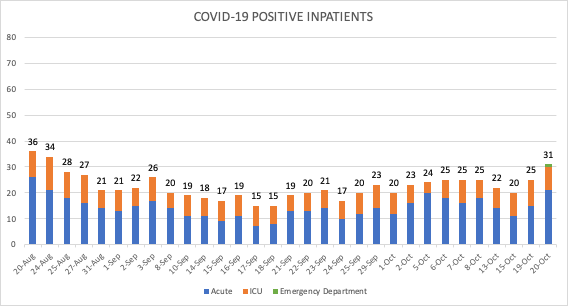Data Snapshot
UW Medicine Hospitals:

King County: The county reported 172 new positive cases and 0 new deaths on Oct. 19.
Washington: The state reported 98,661 cases and 2,258 deaths as of Oct. 18.
United States: The CDC reports 8,128,524 cases and 218,986 deaths as of Oct. 19.
Global: WHO reports 40,251,950 confirmed COVID-19 cases and 1,116,131 deaths as of Oct. 20.
*Numbers update frequently, please follow links for most up-to-date numbers.
COVID-19 Literature Situation Report
COVID-19 Literature Situation Report is a daily (M-F) newsletter put together by the Alliance for Pandemic Preparedness that provides a succinct summary of the latest scientific literature related to the COVID-19 pandemic.
Key Takeaways: COVID-19 Literature Situation Report Oct. 16, 2020
- Children who were infected with SARS-CoV-2 at an overnight camp in Georgia in June transmitted the virus to 9% of their household contacts, with 10% of the adult secondary cases requiring hospitalization. More.
- Results from the WHO Solidarity trial indicate that remdesivir, hydroxychloroquine, lopinavir/ritonavir and interferon regimens did not appear to reduce mortality, initiation of ventilation, or duration of hospital stay in patients with COVID-19. More.
- T-cell immunity against SARS-CoV-2 was found in 78% of potential convalescent plasma donors who had a PCR-confirmed SARS-CoV-2 infection but had undetectable antibodies against the virus, indicating that immunity may be mediated through T-cells even in the absence of an antibody response. More.
UW Medicine in the News
The Washington Post: Why the coronavirus is killing more men than women
Featuring: Nicole Lieberman, Laboratory Medicine
“The power of the immune system wanes as people age, regardless of sex. But what is a gentle decline for women is an abrupt dive off a cliff for men: Iwasaki’s work indicates the T-cell response of men in their 30s and 40s is equivalent to that of a woman in her 90s. And T cells aren’t the only immune feature disproportionately impaired in men. Another paper, published in September in PLOS Biology, examined anonymous human genetic material collected along with viruses in nasal swabs. That study found throttled defense signals in men. When a cell detects a virus, it performs the molecular equivalent of yanking the fire alarm, said one of the study’s author, Nicole Lieberman, a research scientist at the University of Washington. That alarm is manifest in genetic messengers, called RNA, which react almost immediately. The reaction should cause cells to churn out the first lines of defense, such as interferons, immune system molecules that, as the name suggests, interfere with the virus’s ability to reproduce. Other molecules summon specialized immune cells to destroy the pathogens. ‘You want the fire alarm to go off for long enough that you can get the fire department there,’ Lieberman said. Lieberman and her co-authors, however, found that in men and some older populations, the fire alarm shuts off early — maybe even before the firefighters have arrived. ‘That, I think, is the functional consequence, potentially, of what we’re seeing here,’ she said.”
Forbes: Travel Alert: Covid-19 Third Wave Won’t End Until 2021
Featuring: IHME
“The U.S. recently surpassed 8 million Covid-19 cases and 218,000 deaths, and we’re not close to being out of the woods. The death toll is projected to steadily rise throughout the fall and winter until it peaks in mid-January, according to the often-cited model from the Institute for Health Metrics and Evaluation (IHME) at the University of Washington School of Medicine. The same model predicts the illness will claim 171,000 additional fatalities — a whopping 78% increase — between now and February 1, 2021.”
MyNorthwest: Outdoor sports allowed to resume in Washington with restrictions
Featuring: Jonathan Drezner, Sports Medicine
“Dr. Jonathan Drezner, director of the UW Medicine Center for Sports Cardiology and a team physician for the Seattle Seahawks, warns that the new guidance issued by the governor does not mean we’ll see youth practices and games this week, next week, or even at all. Resuming these activities, he said, depends on where you live, the new case averages, and the county’s average infection rates. It also depends on the sport being played. Drezner says soccer, for example, is less likely to spread the virus since bodily contact is brief and it’s an outdoor sport. Disease would seem to have a higher chance of spreading in football and basketball, in which players are face to face throughout the game, he noted. ‘The guiding principal for me, is you don’t want sports to be a mechanism for people to get infected,’ Drezner said.”
